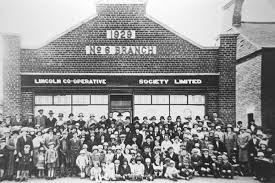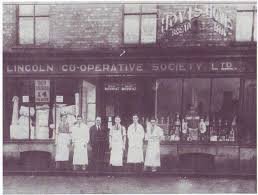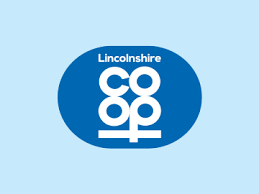In 2011, the Lincolnshire Co-operative Society celebrated its 150th anniversary and, to mark the occasion, it asked Bishop Grosseteste University to make digital copies of all its original paperwork dating back to its inception. The job of doing this fell to Dr Jackson (history lecturer) and henceforth, ignited his interest in all things pertaining to the Lincolnshire Co-operative Society.
Dr Jackson realised that as a child growing up in Devon, the Co-op was unknown to him however, whil st going through the Lincolnshire Co-operative Society’s archives in its HQ in Tentercroft Street in Lincoln, he soon understood its significance in Lincolnshire. As he examined balance sheets dating back to the mid-19th century, he became very aware of what a fabulous insight they gave into the LCS’s early trading activities as well as society in general.
st going through the Lincolnshire Co-operative Society’s archives in its HQ in Tentercroft Street in Lincoln, he soon understood its significance in Lincolnshire. As he examined balance sheets dating back to the mid-19th century, he became very aware of what a fabulous insight they gave into the LCS’s early trading activities as well as society in general.
A co-operative is owned and democratically controlled by its members and, when the Lincolnshire Co-operative Society first began trading at 1 Napoleon Place in Lincoln in 1861, there were 74 members. By 1895, membership had grown considerably and the store in Silver Street had been built. Today, the Lincolnshire Co-operative has over 215 outlets and is owned by around 280,000 members, all of whom get to share its profits which includes paying dividends and a dividend bonus at the end of the year. LCS continues to invest in new and improved services and, in addition to its food stores, it also operates a mill, three farms and libraries, funeral homes, travel agencies, florists, post offices, filling stations and pharmacies as well as having a large property portfolio.
in Silver Street had been built. Today, the Lincolnshire Co-operative has over 215 outlets and is owned by around 280,000 members, all of whom get to share its profits which includes paying dividends and a dividend bonus at the end of the year. LCS continues to invest in new and improved services and, in addition to its food stores, it also operates a mill, three farms and libraries, funeral homes, travel agencies, florists, post offices, filling stations and pharmacies as well as having a large property portfolio.
Dr Jackson was really only able to touch on the amazing rise and history of the Lincolnshire Co-operative Society in the time available nevertheless, he gave us a taster of how the LCS has fostered political and social enrichment over the years in its mission to improve working people’s lives. Whilst it no longer provides many of the services we now expect and receive from our local authority, it still continues its commitment to support the community by giving grants and making donations to numerous choirs, gyms and sports clubs, community groups, local charities and schools throughout Lincolnshire. 

Leave a Reply
You must be logged in to post a comment.